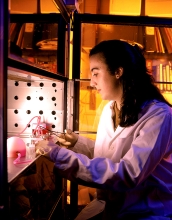|

Media Advisory 05-016
Labor Day: NSF's Portrait of the Workforce

September 1, 2005
With the approach of another Labor Day, the National Science Foundation (NSF) can offer a rich array of data about the nation's science and engineering workforce. The foundation's biannual report, "Science and Engineering Indicators," describes how employment has evolved in a variety of categories, including gender. And a number of other NSF-funded surveys analyze factors such as immigration and emigration, labor markets, and state-by-state comparisons.
For example:
- The number of jobs in the U.S. labor force that require S&E skills is growing faster than the rest of the labor force--which means that we may soon see a gap between supply and demand of S&E-trained employees.
- The percentage of foreign-born mathematicians and computer scientists in the U.S. workforce has nearly doubled since 1990.
- The states with the more educated workforces (that is, more workers with a bachelor's degree) are not necessarily the same states that educate those workers.
NSF also funds a long-running survey called the Panel Study of Income Dynamics (PSID), which show the ups and downs of American family incomes over time. PSID is described in a Special Report on Surveys. http://nsf.gov/news/special_reports/survey/index.jsp?id=income.
-NSF-
Selected reports and briefs:
Science and Engineering Indicators 2004: Chapter 3 (S&E Labor Force)
http://www.nsf.gov/statistics/seind04/c3/c3h.htm
Federal Scientists and Engineers
http://www.nsf.gov/statistics/nsf05304/
Gender Differences in the Careers of Academic Scientists and Engineering
http://www.nsf.gov/statistics/nsf03322/
Degrees in science and engineering occupations
http://www.nsf.gov/statistics/infbrief/nsf04333/
Emigration of scientists and engineers
http://www.nsf.gov/statistics/infbrief/nsf04327/
Related press releases:
NSF Puts Priority on Attracting and Educating a Skilled, Diverse Science and Engineering Workforce
http://nsf.gov/news/news_summ.jsp?cntn_id=100333
States Vary Widely on Indicators of Education, Workforce, R&D Spending and High-Tech Economies
http://nsf.gov/news/news_summ.jsp?cntn_id=100376
United States Still Leads in Science and Engineering, But Uncertainties Complicate Outlook
http://nsf.gov/news/news_summ.jsp?cntn_id=100377
National Science Foundation Releases "Women, Minorities, and Persons with Disabilities in Science and Engineering 2004"
http://nsf.gov/news/news_summ.jsp?cntn_id=100398

Media Contacts
M. Mitchell Waldrop, NSF (703) 292-7752 mwaldrop@nsf.gov

The National Science Foundation (NSF) is an independent federal agency that
supports fundamental research and education across all fields of science and
engineering, with an annual budget of $6.06 billion. NSF funds reach all 50
states through grants to over 1,900 universities and institutions. Each year,
NSF receives about 45,000 competitive requests for funding, and makes over
11,500 new funding awards. NSF also awards over $400 million in
professional and service contracts yearly.
 Get News Updates by Email Get News Updates by Email
Useful NSF Web Sites:
NSF Home Page: http://www.nsf.gov
NSF News: http://www.nsf.gov/news/
For the News Media: http://www.nsf.gov/news/newsroom.jsp
Science and Engineering Statistics: http://www.nsf.gov/statistics/
Awards Searches: http://www.nsf.gov/awardsearch/
| 

